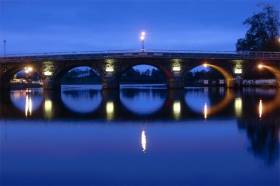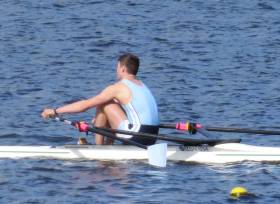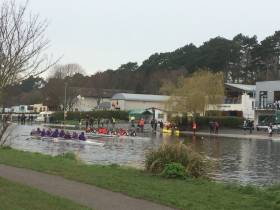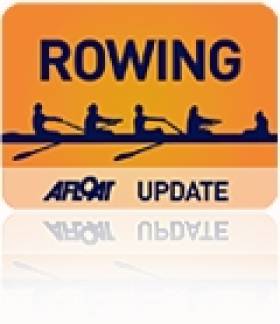Displaying items by tag: Colaiste Iognaid
#Rowing: UCD won only their second senior men's eights Championship of Ireland since 1973 at the National Rowing Centre today. They last won in 2011. They had a clearwater lead by half way and never let it go.
The senior women's eight saw NUIG/Castleconnell also win well. The stern pair of Sadhbh O'Connor and Fiona Murtagh were taking their fourth titles of the weekend.
The final session of the Irish Championships started with a UCD win in the men's novice eight and continued with Ruth Morris of Commercial moving well clear to win the women's intermediate sngle sculls.
Colaiste Iognaid won a battle with Commercial in the men's junior pair, while Lee's junior women matched their junior men by winning the quadruple.
The final race of the whole event, the men's intermediate double, was won by Skibbereen.
Davis Of Lee Valley the Irish Junior Champion at Fourteen
#Rowing: Holly Davis gave the crowds a sensational result at the Irish Championships. The Lee Valley girl came through a good battle with Eabha Benson of St Michael's, to pull away and win. The remarkable thing is that Davis is just 14. She does not turn 15 until January 10th next year, leaving her with four years at Junior level.
The men's junior coxed four also electrified the crowd: Colaiste Iognaid and Enniskillen duked it out down the course. The Galway crew got away to win as their emotional supporters roared them on.
Youth was the theme of this regatta: Kevin O'Donovan, who is a junior, won the club single, while Anna Tyther, also under 18 teamed up with Zoe Hyde to win the intermediate double for Killorglin.
The three other titles on offer in this first Saturday session went three different ways: Commercial's strong senior men's programme was on show as they won the men's quadruple; Cork had a fine win in the intermediate men's eight; Trinity's A crew won the women's novice eight.
#Rowing: The battle of the doubles went the way of the heavyweights at Skibbereen Regatta today. Philip Doyle and Ronan Byrne powered away from Skibbereen lightweights Fintan and Jake McCarthy into the headwind to win.
On a beautiful day, there were clearcut wins in the fours races. UCC's women's crew of Margaret Cremen, Selma Bouanane, Tara Hanlon and stroke woman Emily Hegarty were in control. UCD's men - Shane O'Connell, Andrew Goff, Shane Mulvaney and David O'Malley - were also on top.
The men's Division Two coxed four final had an exciting finish: UCC's club two crew crossed just ahead of Colaiste Iognaid's junior crew.
#Rowing: The Afloat Rowers of the Month for April are the Enniskillen girls’ and boys’ junior 18 eights which won at Commercial and Neptune regattas, respectively. The young women won the final race at Commercial, beating the hosts in a fine contest which drew the curtain on more than two days of action at Islandbridge. Enniskillen’s boys’ junior 18 eight had beaten Coláiste Iognáid at Neptune regatta on the Saturday.
Enniskillen’s fine run recently has included outstanding placings in the Schools’ Head of the River in London, where the girls placed fourth and the boys sixth – and sixth fastest overall.
Rower of the Month awards: The judging panel is made up of Liam Gorman, rowing correspondent of The Irish Times and David O'Brien, Editor of Afloat magazine. Monthly awards for achievements during the year will appear on afloat.ie. Keep a monthly eye on progress and watch our 2019 champions list grow.
Colaiste Iognaid Edged Out by Methody at Irish Schools' Regatta
Good Day for Shandon and Coláiste Iognáid
#Rowing: The weather held up well for both the Muckross Head of the River and the Head of the Shannon at Carrick on Shannon today.
Shandon’s men’s intermediate eight topped the Muckross provisional rankings at the National Rowing Centre, while their men’s senior quadruple and men’s club eight placed fifth and sixth. UCC’s women’s club eight were the fastest women’s crew.
The Coláiste Iognáid men’s junior 18 eight took the honours at Carrick on Shannon. They competed in the second head, at 2 o’clock, which had the superior weather conditions. Commercial’s men’s senior eight took second.
Great Day for Coláiste Iognáid Rowers at Irish Schools' Regatta
#Rowing: Galway’s Coláiste Iognáid won the prize as the top school at the Irish Schools’ Regatta at O’Brien’s Bridge today. There were 11 hours of competition on a sunny, cool day. St Brigid’s, Killarney, which won the women’s under-23 eight, were second overall – Coláiste Iognáid had won the equivalent men’s race and the Junior 16 men’s eight.
Coleraine Grammar School had a good day. They won the women’s junior 16 eight and Molly Curry won the women’s under-23 single, though she is still a teenager. Jack Dorney, competing for St Francis, was the top men’s under-23 sculler. Tristan Orlic of St Vincent's took the honours at junior 16 level.
Irish Schools’ Regatta, O’Brien’s Bridge, Sunday (Selected Results)
Men
Eight – Under-23: Col Iognáid. Jun 16: Col Iognáid.
Four – Under-23, coxed: CBC, Cork B. Junior 16, coxed: Pres, Cork.
Pair – Under-23: CRCC.
Sculling, Quadruple – U-23: CRCC. Jun 16, coxed: Skibbereen CS.
Double – U-23: St Francis. Jun 16: St Coleman’s.
Single – Under-23: St Francis (J Dorney). U-16: St Vincent’s (T Orlic)
Women
Eight – U-23: St Brigid’s, Killarney. Jun 16: Coleraine GS.
Four – U-23: Regina Mundi. Jun 16, coxed: Coleraine GS.
Pair – U-23: Col Iognáid.
Sculling, Quadruple – U-23: St Brigid’s. Jun 16, coxed: Laurel Hill A.
Double – U-23: St Brigid’s B. Jun 16: St Leo’s.
Single – U-23: Coleraine GS (M Curry) 6:25. Jun 16: Laurel Hill (N Kiely).
#Rowing: Trinity won the men’s senior eight at Commercial Regatta at Islandbridge today. Commercial had divided their Championships winning eight into two crews. The rain came – at almost exactly the same time as in Saturday’s Neptune Regatta, but the full set of races were held. Neptune beat Commercial in the women’s club one eight, one of the last of a long day.
Commercial Regatta, Islandbridge, Sunday (Selected Results)
Men,
Eight – Senior: Trinity bt Commercial, 2l. Club One: UCD bt Commercial 1l. Novice: UCD B bt Trinity A 1l. Jun 18A: Neptune beat Coláiste Iognáid 1l. Jun 15: Athlone bt Coleraine GS 4l.
Four – Inter, coxed: Trinity bt Commercial 2l. Club One, coxed: Commercial B bt Neptune, canvas. Jun 18A: Col Iognaid bt New Ross 3l.
Sculling, Quadruple – Club One, coxed: Neptune bt Commercial, scratched. Novice: Commercial bt Neptune 1l. Jun 18A, coxed: Col Iognaid bt Blackrock ½ l. Jun 16, coxed: Blackrock A bt Coleraine GS 1 ½ l.
Double – Senior: Commercial/Neptune bt Neptune ½ l. Club One: King’s Hospital bt Neptune distance. Jun 18A: Neptune C bt Three Cstles B 2l. Jun 16: Blackrock bt Carlow B 3l.
Single – Inter: Sligo (G Patterson) bt Offaly (C Brady) 3l. Club One: Lagan (N Darby) bt Carrick-on-Shannon (E Djeribi) 5l. Jun 18: Carrick (F Early) bt Neptune (S Byrne) 1l.
Women
Eight – Inter: Commercial bt Trinity 3l. Club One: Neptune bt Commercial 1 ½ l. Nov: UCD A bt UCD B distance. Jun 18A: Col Iognaid bt Commercial 3l. Jun 16: Coleraine Grammar School bt Commercial 1 ½ l.
Four – Senior, coxed: Commercial A bt Commercial B 1l. Inter: Commercial B bt Commercial A, distance. Club One, coxed: UCD D bt UCD B 3l. Jun 18A, coxed: Col Iognaid bt Commercial ½ l.
Sculling, Quadruple – Club One, coxed: Neptune A bt Athlone ¾ l. Nov, coxed: Neptune bt Trinity 2l. Jun 18, coxed: Col Iognaid bt Sligo 4l. Jun 16, coxed: Commercial bt Neptune 2l.
Double – Club One: King’s Hos A bt King’s Hos B, 3l. Jun 18A: Commercial A bt Carrick-on-Shannon 3l. Jun 16: Commercial bt Athlone A 3l.
#Rowing: The first set of finals at Neptune Regatta was a good one for UCD. Their B crew beat Neptune – by three-quarters of a length – in the competitive club one eights and their B crew beat Trinity in the novice eights. However, Trinity won the battle of the senior coxed fours – their B crew beat UCD. The host club provided be the top junior 18 eight, beating Coláiste Iognáid in the final.
The women’s junior 18 eight gave Graiguenamanagh a win over Coláiste Iognáid by a canvas, while the club one eights went to Commercial, who beat UCD B. In the closest race of the session, Katie Dolan of Commercial beat Niamh Clarke of Neptune by just one foot in the women’s junior 18 single sculls. Luke Sutton of New Ross won the men’s junior 18 single.
Neptune Regatta, Islandbridge, Saturday (Selected Results)
Men
Eight – Club One: UCD B bt Neptune ¾ l, 3:20. Novice: UCD B bt Trinity 3l, 3:30. Junior 18: Neptune bt Col Iognaid 2l, 3:27. Jun 15: Bann bt St Joseph’s 1 ½ l.
Four – Senior, coxed: Trinity B bt UCD 2l, 3:35. Masters, coxed: Athlone bt Neptune ¾ l.
Sculling, Quadruple – Jun 16, coxed: Fermoy bt Bann 3:50.
Double – Jun 16: Col na Coiribe bt Commercial A 3l, 4:01.
Single – Club Two: Clonmel (S O’Donnell) bt Garda (P Ryan) 4l, 4:25. Jun 18: New Ross (L Sutton) bt Commercial (C Kelly) easily, 4:00.
Women
Eight – Club One: Commercial bt UCD B 2l, 3:50. Jun 18: Graiguenamanagh bt Col Iognaid, canvas 3:53. Novice: UCD A bt UCD B 4l, 4:00. Jun 15: Galway bt Enniskillen 4l.
Sculling, Quadruple – Jun 16, coxed: Commercial bt Carlow 2 ½, 4:12. Double – Jun 16: Fermoy A bt Commercial B, easily, 4:34.
Single – Club Two: Clonmel (S McGrath) bt Clonmel (E Fitzpatrick) 4l. Jun 18: Commercial (K Dolan) bt Neptune (N Clarke) 1ft, 4:30.
Great Day for Enniskillen at Irish Schools Regatta
#ROWING: Two schools from Enniskillen took some of the major honours on offer at the Irish Schools Regatta at O’Brien’s Bridge. Enniskillen Collegiate won the women’s under-23 eights, fours and pairs, and Portora Royal School won the under-23 eights and pairs. Presentation Brothers College, Cork, took the men’s coxed fours. Waterpark College’s Andrew Goff was the top single sculler, and Sarah Murphy of Gaelcholáiste Luimnigh the top women’s sculler.
Irish Schools Regatta 2015, O’Brien’s Bridge, Selected Results
Men
Eight – Under-23: 1 Portora, 2 St Joseph’s, 3 Presentation, Cork. Junior 16: 1 St Joseph’s, 2 Col Iognáid, 3 Presentation, Cork. Jun 15: 1 St Joseph’s, 2 Pres, Cork, 3 Portora.
Four – Under-23, coxed: 1 Pres, Cork, 2 St Joseph’s, 3 CBS, Cork. Jun 16: 1 Portora, 2 Col Iognáid, 3 St Joseph’s B. Junior 15, coxed: 1 St Joseph’s A, 2 Portora, 3 Presentation Cork.
Pair – Under-23: 1 Portora A, 2 St Joseph’s B, 3 Ardscoil A.
Sculling
Quadruple – Under-23: 1 Schull CS, 2 Methody, 3 CBC, Cork. Junior 16, coxed: 1 Ardscoil A, 2 Methody, 3 Killorglin. Jun 15, coxed: 1 CBC Cork A, 2 CAI, 3 Methody.
Double – Under-23: 1 Schull CS A, 2 Marist, 3 Summerhill. Junior 16: 1 Rochestown, 2 Methody, 3 Pres, Carlow. Jun 15: 1 St Mary’s, Carlow, 2 CBC, Cork, 3 Castleknock.
Single – Under-23 (Final One, Timed): 1 Waterpark (A Goff), 2 St Munchin’s (Carmody), 3 Rochestown (Larkin). (Final Two, Timed): Portora (Murray). Jun 16: 1 Castleknock (Meehan), 2 Rochestown (Larkin), 3 Ardscoil Dub (Lynch). Jun 15 – Final One: 1 St Mary’s, Carlow (J Keating), 2 Carrigaline CC (S O’Neill), 3 CBC (T Murphy). Final Two: Ardscoil (O’Byrne).
Women
Eight – Under-23: 1 Enniskillen, 2 Laurel Hill, 3 Mount Lourdes. Jun 16: 1 Col Iognáid, 2 Methody, 3 Laurel Hill. Jun 15: 1 Col Iognáid, 2 Enniskillen
Four – Under-23: 1 Enniskillen, 2 Mount Lourdes. Jun 16, coxed: 1 Col Iognáid B, 2 Enniskillen, 3 Col Iognáid A. Jun 15, coxed: 1 Col Iognaid, 2 Mount Lourdes.
Pair – Under-23: 1 Enniskillen, 2 Laurel Hill B, 3 Laurel Hill A.
Sculling
Quadruple – Under-23: 1 St Leo’s, 2 Loreto, Fermoy A, 3 Loreto, Fermoy B. Junior 16, coxed: 1 Gaelcholáiste Cheatharlach, 2 Regina Mundi, 3 St Leo’s. Jun 15: 1 Loreto, Fermoy A, 2 Christ the King, Cork, 3 St Brigid’s A.
Double – Under 23 (Final One, Timed): 1 St Angela’s, Cork, 2 Methody, 3 Ursuline, Sligo. Final Two, timed: Sacred Heart. Final Three, timed: St Leo’s B. Jun 16: St Dominic’s, 2 Sacred Heart, 3 Christ the King A. Jun 15: 1 Regina Mundi, 2 Loreto, Fermoy, 3 St Louis.
Single – Under-23: 1 Gaelcholáiste Luimnigh (S Murphy), 2 Christ the King (Cummins), 3 Methody (Deyermond). Junior 16: Scoil Mhuire (Synnott), 2 Loreto Fermoy (O’Sullivan). Jun 15 (Final One): Loreto, Fermoy (Murphy). Final Two: Loreto (McGirr).



























































